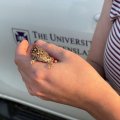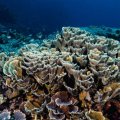The University of Queensland has received the largest share of funding in the country for Australian Research Council Linkage project grants.
UQ received funding for 16 projects worth a total of $6.234 million, with research in areas such as making our food and drinks healthier and improving our crop and mining production.
The ARC Linkage Projects scheme aims to develop long-term strategic research alliances between universities and groups such as industry, businesses, and community organizations.
One of the more innovative projects to receive funding is led by Professor Justin Cooper-White from UQ’s Australian Institute for Bioengineering and Nanotechnology in conjunction with Unilever UK Central Resources Limited. The project has received $240,000 to look at designing foods and drinks that have tailored health and vitality benefits.
Professor Cooper-White said examples of this research could help reduce levels of fat, sugar and salt in our food.
“In addition, these foods will contain beneficial additives such as anti oxidants, vitamins, minerals and phytonutrients targeted to specific consumer groups according to their lifestyle, age, medical condition or nutritional requirements, thereby contributing to healthy ageing,” Professor Cooper-White said.
Professor Peter Hayes, Director of the Pyrometallurgy Research Centre (PYROSEARCH) in UQ's School of Engineering, received $1.21 million in the largest of the UQ grants, to look at improving the environmental and economic performance of copper smelting.
Professor Hayes said that with Australia in the middle of a minerals boom, it was important to increase the country’s competitive edge and improve our processes.
“Most of the primary production of copper metal in Australia takes place through the use of high temperature smelting technologies,” Professor Hayes said.
“New technologies and significant changes to existing smelting technologies are currently underway, driven by the need to improve both productivity and environmental performance.”
The project will involve partners BHPBilliton (Olympic Dam Operations), Xstrata Copper Mount Isa Mines, Xstrata Technology and Rio Tinto Technology
Research into improved sugar cane production will also be helped with a $900,000 grant.
Professor Robert Birch, from UQ’s School of Integrative Biology, said the funding would be used to look at the problem of introduced genes being “silenced” and not working. His partner in the project is CSR Sugar.
UQ Deputy Vice-Chancellor (Research), Professor David Siddle, said the funding recognised UQ’s strong research links within the Australian community.
“The projects that have received funding cover a wide array of problems, for which UQ researchers and their industry and community partners are striving to find innovative and unique solutions,” Professor Siddle said.
“The University of Queensland takes it role as a leader in research and innovation for the betterment of the wider community very seriously and we are pleased to be recognised for that.”
Other UQ projects to receive significant funding include:
Professor Stuart Crozier, from the School of Information Technology and Electrical Engineering, received $620,000 to lead a project to develop a new generation of Magnetic Resonance Imaging systems that are capable of greater resolution and speed of imaging.
Professor Gwen Jull, from the School of Health & Rehabilitation Sciences, received $759,000 to lead a project to develop and evaluate new models of physiotherapist training incorporating standardised patients (actors) and simulators (mannequins) to increase education capacity. With an ageing population increasing numbers of physiotherapists are being trained but education practices have remained the same. This project hopes to address that problem.
Professor Jake Najman, from the School of Social Science, received $382,000 to lead a project looking at amphetamine use among young people in South-East Queensland.
Dr Susanne Schmidt, from the School of Integrative Biology, received $510,000 to lead a project looking at making trees grow faster, making them more adaptable to the environmental pressures of climate change.
Media inquiries: Andrew Dunne at UQ Communications (07 3365 2802 or 0433 364 181).


